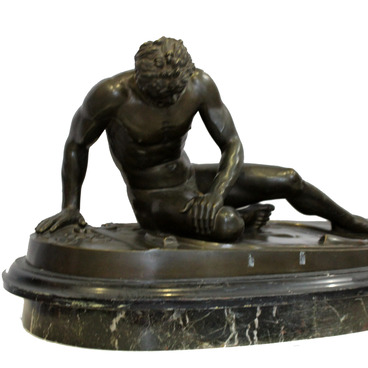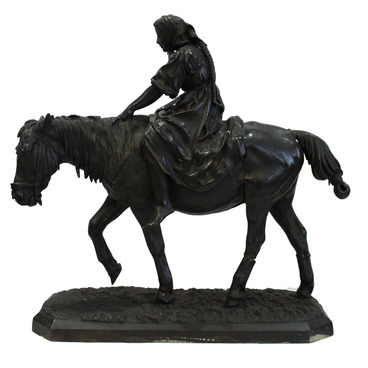Grigory Orlov (1734–1783) was the second oldest of the Orlov brothers. He spent his childhood in Moscow, receiving his primary education at home. He then attended the First Cadet Corps (the Cadet Corps of the Land Forces) in Saint Petersburg. He took part in the Seven Years War. At the Battle of Zorndorf (1758), he was consecutively wounded three times but did not leave the battlefield, continuing to fight and encourage his soldiers until the battle was over.
In 1762, he took an active part in the coup that helped Catherine ascend the Russian throne. On the day Catherine the Great ascended the throne, artillery captain Grigory Orlov was promoted to major general. On the same day, he was awarded the title of chamberlain, decorated with the Order of St. Alexander Nevsky, and presented with a diamond-studded sword.
On the day of her coronation, the Empress promoted Major General Grigory Orlov to lieutenant general and appointed him her general adjutant. In addition, by the royal decree of September 22 (October 3) 1762, the Orlov brothers were granted the title of counts with the right to pass it on to their descendants.
In 1770, an outbreak of plague hit Moscow, which resulted in mass riots. Learning about the impotence of the Moscow government, Catherine the Great dispatched her favorite Grigory Orlov to restore order in the city without resorting to repressions. One of the measures he implemented included a monetary reward for people who got discharged from hospitals: married people got 10 roubles and single ones got 5 roubles each. This proved a more effective measure against hiding the sick than threats of punishment. In addition, Grigory Orlov personally encouraged the desperate local residents by addressing them publicly on the streets and squares of the city. The locals were very much touched by the personal visit of the empress’s favorite.
In commemoration of Grigory Orlov’s success in restoring order in Moscow, a triumphal arch was put up in Tsarskoye Selo (now Pushkin, Leningrad Region), with the inscription reading: ‘The Orlovs Spared Moscow the Calamity.’ The mint made coins commemorating this event too.
Grigory Orlov patronized the development of arts and science. It was Grigory Orlov who introduced mechanic Ivan Kulibin to the Empress and insisted that funds be allocated to scientific research. As an avid amateur physicist and natural scientist himself, he adored Mikhail Lomonosov. Grigory Orlov also gave the go-ahead to the production of Denis Fonvizin’s comedy The Minor. He founded the park and palace estate in Gatchina, which is today regarded as his main legacy. Gatchina was given to him by Catherine the Great in 1765. The very next year construction began on the Big Gatchina Palace designed by Italian architect Antonio Rinaldi.
For his achievements, Grigory Orlov was decorated with the Order of Saint First-Called Apostle Andrew and two gold medals with the inscription reading: “Russia is Proud to Have a Son Like This.”
In 1762, he took an active part in the coup that helped Catherine ascend the Russian throne. On the day Catherine the Great ascended the throne, artillery captain Grigory Orlov was promoted to major general. On the same day, he was awarded the title of chamberlain, decorated with the Order of St. Alexander Nevsky, and presented with a diamond-studded sword.
On the day of her coronation, the Empress promoted Major General Grigory Orlov to lieutenant general and appointed him her general adjutant. In addition, by the royal decree of September 22 (October 3) 1762, the Orlov brothers were granted the title of counts with the right to pass it on to their descendants.
In 1770, an outbreak of plague hit Moscow, which resulted in mass riots. Learning about the impotence of the Moscow government, Catherine the Great dispatched her favorite Grigory Orlov to restore order in the city without resorting to repressions. One of the measures he implemented included a monetary reward for people who got discharged from hospitals: married people got 10 roubles and single ones got 5 roubles each. This proved a more effective measure against hiding the sick than threats of punishment. In addition, Grigory Orlov personally encouraged the desperate local residents by addressing them publicly on the streets and squares of the city. The locals were very much touched by the personal visit of the empress’s favorite.
In commemoration of Grigory Orlov’s success in restoring order in Moscow, a triumphal arch was put up in Tsarskoye Selo (now Pushkin, Leningrad Region), with the inscription reading: ‘The Orlovs Spared Moscow the Calamity.’ The mint made coins commemorating this event too.
Grigory Orlov patronized the development of arts and science. It was Grigory Orlov who introduced mechanic Ivan Kulibin to the Empress and insisted that funds be allocated to scientific research. As an avid amateur physicist and natural scientist himself, he adored Mikhail Lomonosov. Grigory Orlov also gave the go-ahead to the production of Denis Fonvizin’s comedy The Minor. He founded the park and palace estate in Gatchina, which is today regarded as his main legacy. Gatchina was given to him by Catherine the Great in 1765. The very next year construction began on the Big Gatchina Palace designed by Italian architect Antonio Rinaldi.
For his achievements, Grigory Orlov was decorated with the Order of Saint First-Called Apostle Andrew and two gold medals with the inscription reading: “Russia is Proud to Have a Son Like This.”

